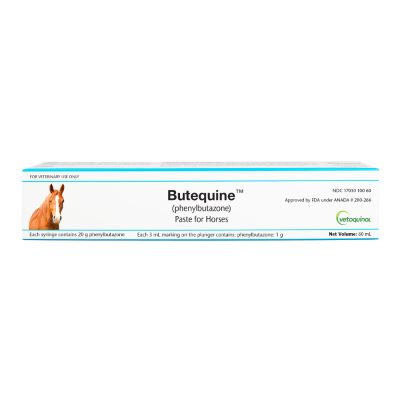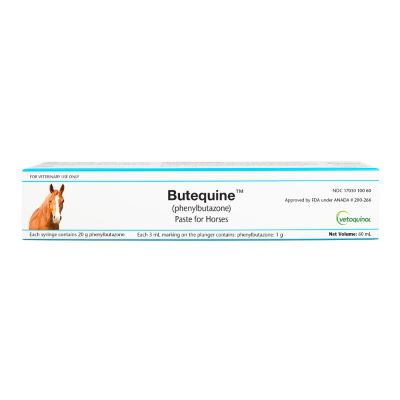Free Delivery on $50+*
Providing Quality & Trust
Butequine Paste Phenylbutazone
Vetoquinol USA
Starting at $82.96
$82.96 Each
Detailed Description
Butequine (phenylbutazone) Paste for Horses
Butequine is, without doubt, among the strongest and most useful ways to manage pain and inflammation in horses. This is a veterinarian-approved medication developed to treat some musculoskeletal conditions, including arthritis, laminitis, or other conditions with inflammatory elements. It is a paste syringe for easy dosing and administration at a professional treatment facility and home. Its fast-acting formula quickly brings relief to your horse so that it may recover and once again perform to the best of its abilities.
Butequine is a phenylbutazone paste syringe for horses, which is one of the most important medicines for pain and inflammation management in horses. This veterinarian-approved treatment against problems like arthritis and laminitis delivers quick, fast-acting relief. Its convenient paste syringe allows for quick, easy, and accurate administration, making it just as fitting for both professional and at-home care.
Indications:
For the relief of inflammatory conditions associated with the musculoskeletal system in horses.
- Potent analgesic: Phenylbutazone, being a potent analgesic, helps to provide effective analgesia from musculoskeletal pain and inflammation disorders in horses.
- Reduction in inflammation: Reduces inflammation, swelling, and stiffness. This makes the horse more comfortable and mobile.
- So easy to use: The syringed paste helps in easy application to the horse and ensures the dosage into its mouth to facilitate precision in dosing.
- Quick Acting: This acts very quickly to bring relief from pain and inflammation so the horse can recover quickly to return to a normal routine of life.
- Multi-Functional Use: Assisting in the relief of several conditions such as arthritis, lameness, and injury associated with the body's joints and muscles.
- Recommended by Vets: With their capability of acting successfully to help horses from pain and inflammation, they are recommended by many veterinarians.
- Improving Quality of Life: Butequine contributes to the overall quality of life for most horses by controlling pain and inflammation; it achieves improved comfortable movement.
Administration & Dosage:
Orally 1 to 2g of phenylbutazone per 500 lb. (227 kg) of body weight daily. Do not exceed 4g daily.
Guidelines for Succesful Therapy:
- Important - To avoid overdosing and to ensure the correct first dose, move the ring-on lunger to the appropriate dosage position before administration. The edge of the ring closest to the syringe barrel should be aligned to the gram/dosage mark on the plunger.
- When administering Butequine paste the oral cavity should be empty. Set the ring on the plunger to deliver the appropriate dosage on weight. Deposit paste on the back of the tongue by depressing the plunger.
- Use a relatively high dose for the first 48 hours (not to exceed 4g daily), then reduce gradually to a maintenance dose. Maintain the lowest dose capable of producing a desired clinical response.
- Response to Butequine paste therapy is prompt, usually occurring within 24 hours. If no significant clinical response is evident after 5 days, reevaluate the diagnosis and therapeutic approach.
- Many chronic conditions will respond to Butequine paste therapy, but discontinuance of treatment may result in the recurrence of symptoms.
Storage:
Store at 15°-25°C (59°-77°F).
Precautions:
Stop medication at the first sign of gastrointestinal upset, jaundice, or blood dyscrasia. Authenticated cases of agranulocytosis associated with the drug have occurred in men; fatal reactions, although rare, have been reported in dogs after long-term therapy. To guard against the possibility, conduct routine blood counts at weekly intervals during the early phase of therapy and at intervals of two weeks thereafter. Any significant fall in the total white blood cell count, relative decrease in granulocytes, or black or tarry stools should be regarded as a signal for immediate cessation of therapy and institution of appropriate counter-measures. In the treatment of horse anti inflammatory conditions associated with infections, specific anti-infective therapy is required.
Warning:
Do not use horses intended for human consumption.

Powered by nopCommerce
This site is running in live payment mode. Real payments will be processed.

